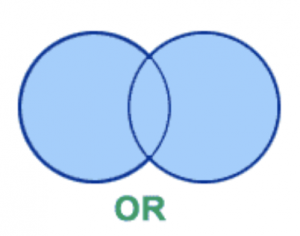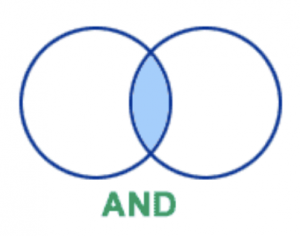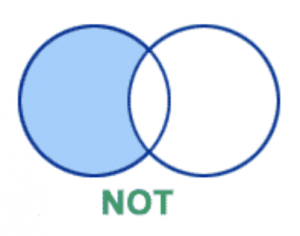Combining your search terms
Combine with Boolean operators
To combine the different search terms the boolean operators of OR and AND need to be used.

OR operator broadens your search
Use the boolean operator OR to combine keywords related to a single concept. This broadens your search, increasing the number of results. This means that each search term listed for allergic rhinitis would be combined with an OR, and similarly for acupuncture.

AND operator narrows your search
Use the boolean operator AND to combine keywords related to different concepts. This narrows your search, decreasing the number of results. The search results for allergic rhinitis would be combined with an AND with the search results for acupuncture.

NOT operator narrows your search
Use the boolean operator NOT operator to exclude a term. This is useful if you don’t want to find any records that contain a particular term. Use it with care to avoid excluding relevant articles that briefly mention the second term. Searching for allergic rhinitis NOT children will exclude all records that mention children as well as allergic rhinitis and children together.
Test your knowledge
The search query
The search features of library databases make constructing your search query easier, especially when using advanced search options. For example, the Boolean operators can usually be selected from a drop-down menu. Some databases allow you to enter the search terms on separate lines of an Advanced or Basic search form. Concepts can be entered on separate lines that are then combined using the OR and AND operators.
Best Practice Tip
If there are many synonyms and subject headings for a single concept, you may find it helpful to break this concept into a couple of separate searches that you can then combine using OR, as in the example below. The first concept is allergic rhinitis and the second concept is acupuncture.
Search query
| Search line | Terms combined | Notes |
|---|---|---|
| 1 | “Allergic rhinitis” OR hayfever OR “hay fever” OR pollinosis OR “rose fever” OR “perennial hayfever” OR “seasonal hayfever” | Concept 1 keyterms |
| 2 | “Rhinitis, Alllergic”[Mesh] OR “Rhinitis, Allergic, Seasonal”[Mesh] OR “Rhinitis, Allergic, Perennial”[Mesh] OR “Respiratory Hypersensitivity”[Mesh] | Concept 1 MeSH headings |
| 3 | 1 OR 2 | All Concept 1 |
| 4 | “plum blossom” OR “ear acupuncture” OR “ear acupressure” OR auricular therapy OR moxa OR “laser acupuncture” OR “seven star needle” OR “electro-acupuncture” OR “electro acupuncture” OR TENS OR “transcutaneous electrical nerve stimulation” OR “transcutaneous nerve stimulation” OR “electrostimulation” OR pharmoacupuncture OR “point injection” | Concept 2 keyterms |
| 5 | “Acupuncture”[Mesh] OR “Meridians”[Mesh] OR” Electroacupuncture”[Mesh] OR “Moxibustion”[Mesh] OR “Auriculotherapy”[Mesh] OR “Acupressure”[Mesh] OR “Acupuncture, Ear”[Mesh] OR “Acupuncture Therapy”[Mesh] OR “Acupuncture, Analgesia”[Mesh] OR “Acupuncture Points”[Mesh] OR ‘Transcutaneous Electric Nerve Stimulation”[Mesh] | Concept 2 MeSH headings |
| 6 | 4 OR 5 | All Concept 2 |
| 7 | 3 AND 6 | Combined concepts |
Our search query using the PubMed database and the listed keywords and MeSH terms for allergic rhinitis, and similarly for acupuncture, would look like the following.
Example search query
“Allergic rhinitis” OR hayfever OR “hay fever” OR pollinosis OR “rose fever” OR “perennial hayfever” OR “seasonal hayfever” OR “Rhinitis, Alllergic”[Mesh] OR “Rhinitis, Allergic, Seasonal”[Mesh] OR “Rhinitis, Allergic, Perennial”[Mesh] OR “Respiratory Hypersensitivity”[Mesh] AND “plum blossom” OR “ear acupuncture” OR “ear acupressure” OR auricular therapy OR moxa OR “laser acupuncture” OR “seven star needle” OR “electro-acupuncture” OR “electro acupuncture” OR TENS OR “transcutaneous electrical nerve stimulation” OR “transcutaneous nerve stimulation” OR “electrostimulation” OR pharmoacupuncture OR “point injection” OR “Acupuncture”[Mesh] OR “Meridians”[Mesh] OR” Electroacupuncture”[Mesh] OR “Moxibustion”[Mesh] OR “Auriculotherapy”[Mesh] OR “Acupressure”[Mesh] OR “Acupuncture, Ear”[Mesh] OR “Acupuncture Therapy”[Mesh] OR “Acupuncture, Analgesia”[Mesh] OR “Acupuncture Points”[Mesh] OR ‘Transcutaneous Electric Nerve Stimulation”[Mesh]

